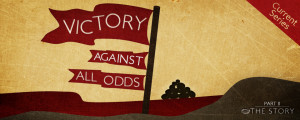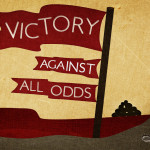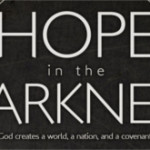Apr 26, 2015
The Faith of a Foreign Woman
Series: Victory Against All Odds
 This week we are in chapter 9 of The Story. If a video camera was rolling
through this chapter you would find many different expressions:
anticipation and joy, disillusionment and disappointment, anger and
bitterness. The story takes places during the period of the Judges, but
it’s not about a judge and really doesn’t appear to be about the nation of
Israel. On the surface it doesn’t seem to make much sense as a book in the
Bible it appears to be a story of a random family with a husband named
Elimelech and his wife named Naomi. It’s not long before a couple of sons
are born, and the story seems to be going as planned. But then a famine
strikes, and this family is forced to move to the land of Moab. Once they
arrive, the two sons marry two Moabite women Ruth and Orpah. But it’s not
long before Elimelech and his two sons die, leaving three widows.
This week we are in chapter 9 of The Story. If a video camera was rolling
through this chapter you would find many different expressions:
anticipation and joy, disillusionment and disappointment, anger and
bitterness. The story takes places during the period of the Judges, but
it’s not about a judge and really doesn’t appear to be about the nation of
Israel. On the surface it doesn’t seem to make much sense as a book in the
Bible it appears to be a story of a random family with a husband named
Elimelech and his wife named Naomi. It’s not long before a couple of sons
are born, and the story seems to be going as planned. But then a famine
strikes, and this family is forced to move to the land of Moab. Once they
arrive, the two sons marry two Moabite women Ruth and Orpah. But it’s not
long before Elimelech and his two sons die, leaving three widows.WatchNotesDownloadDateTitle
- Apr 26, 2015The Faith of a Foreign WomanApr 26, 2015The Faith of a Foreign WomanSeries: Victory Against All Odds
 This week we are in chapter 9 of The Story. If a video camera was rolling
through this chapter you would find many different expressions:
anticipation and joy, disillusionment and disappointment, anger and
bitterness. The story takes places during the period of the Judges, but
it’s not about a judge and really doesn’t appear to be about the nation of
Israel. On the surface it doesn’t seem to make much sense as a book in the
Bible it appears to be a story of a random family with a husband named
Elimelech and his wife named Naomi. It’s not long before a couple of sons
are born, and the story seems to be going as planned. But then a famine
strikes, and this family is forced to move to the land of Moab. Once they
arrive, the two sons marry two Moabite women Ruth and Orpah. But it’s not
long before Elimelech and his two sons die, leaving three widows.
This week we are in chapter 9 of The Story. If a video camera was rolling
through this chapter you would find many different expressions:
anticipation and joy, disillusionment and disappointment, anger and
bitterness. The story takes places during the period of the Judges, but
it’s not about a judge and really doesn’t appear to be about the nation of
Israel. On the surface it doesn’t seem to make much sense as a book in the
Bible it appears to be a story of a random family with a husband named
Elimelech and his wife named Naomi. It’s not long before a couple of sons
are born, and the story seems to be going as planned. But then a famine
strikes, and this family is forced to move to the land of Moab. Once they
arrive, the two sons marry two Moabite women Ruth and Orpah. But it’s not
long before Elimelech and his two sons die, leaving three widows. - Apr 19, 2015A Few Good Men and WomenApr 19, 2015A Few Good Men and WomenSeries: Victory Against All OddsThe Bible says that the nation of Israel followed God faithfully throughout the life of Joshua and the elders who succeeded him. But when that generation of leaders died out, the Israelites spent the next 400 years in a cycle: disobedience, punishment, repentance, and deliverance (Judges 2:10). So the new generation began to worship the pagan gods of their new land, until God finally used those pagan nations to punish them. God would punish them by allowing them to be oppressed by one of the neighboring tribal nations. They would cry out to God in repentance and beg for deliverance. During those times of punishment, God would raise up Judges political, military, and spiritual leaders to lead Israel back to Himself. There were several Judges, but a few of them capture the cycle of the entire 400-year period.
- Apr 12, 2015The Battle BeginsApr 12, 2015The Battle BeginsSeries: Victory Against All OddsWe often try and avoid situations where courage is required. We prefer to play it safe, to avoid the risks, to stay within our boundaries. In the swimming pool of life, most of us try and stay in the shallow end. But there are moments—defining moments—in our stories where we will be called upon to be men and women of courage. They may not be as dramatic as a shielding your children from a tornado or running for help in a life and death situation, but we will all have moments that will test our courage. In chapter 7 we read about Joshua who was a man of great courage. He is leading Israel back to the Promised Land that they refused to enter 40 years earlier (Num. 13:27), and in Joshua 1:1-7, as God prepares Joshua to lead the charge, He urges him to "be strong and very courageous (v. 7)."
- Apr 5, 2015Living the Victory!Apr 5, 2015Living the Victory!Series: (All)
 Of all the things in life, one is number one. Of all the teachings in the
Bible, one is primary. Of all the things in the world, one is prime. The
apostle Paul names what this is in His letter to the Corinthians. He calls
it “of first importance” when he says: “For I delivered to you as of first
importance what I also received: that Christ died for our sins in
accordance with the Scriptures, that He was buried, that He was raised on
the third day in accordance with the Scriptures” (1 Corinthians 15:3–4).
The Gospel of Jesus, our Savior, is what is of first importance. This
Easter, we celebrate that Jesus’ death, burial, and resurrection is of
first importance. Knowledge of this one thing changes our perspective on
everything else. What could be more important to know?
Of all the things in life, one is number one. Of all the teachings in the
Bible, one is primary. Of all the things in the world, one is prime. The
apostle Paul names what this is in His letter to the Corinthians. He calls
it “of first importance” when he says: “For I delivered to you as of first
importance what I also received: that Christ died for our sins in
accordance with the Scriptures, that He was buried, that He was raised on
the third day in accordance with the Scriptures” (1 Corinthians 15:3–4).
The Gospel of Jesus, our Savior, is what is of first importance. This
Easter, we celebrate that Jesus’ death, burial, and resurrection is of
first importance. Knowledge of this one thing changes our perspective on
everything else. What could be more important to know? - Mar 29, 2015WanderingsMar 29, 2015WanderingsSeries: Victory Against All Odds
 Once Israel was delivered out of Egypt, the plan was to get to the Promised
Land—a land "flowing with milk and honey"—which means it was a beautiful,
fertile, prosperous place. And there was a route they could have taken from
Egypt to Canaan that Isaiah calls "the way of the sea" (Isaiah 9:1) because
it followed the Mediterranean Sea. That would have been the direct route.
Here are few things about this direct route: It was the shortest distance,
the most scenic route, and the most popularly traveled. But God doesn't
take them on the Direct Route. Instead, Israel wanders in the wilderness
for 40 years. Let’s define "wandering" this way: Living in the space
between where I started and where I want to be. The question is this: How
do you live in the space between?
Once Israel was delivered out of Egypt, the plan was to get to the Promised
Land—a land "flowing with milk and honey"—which means it was a beautiful,
fertile, prosperous place. And there was a route they could have taken from
Egypt to Canaan that Isaiah calls "the way of the sea" (Isaiah 9:1) because
it followed the Mediterranean Sea. That would have been the direct route.
Here are few things about this direct route: It was the shortest distance,
the most scenic route, and the most popularly traveled. But God doesn't
take them on the Direct Route. Instead, Israel wanders in the wilderness
for 40 years. Let’s define "wandering" this way: Living in the space
between where I started and where I want to be. The question is this: How
do you live in the space between? - Mar 22, 2015New Commands and a New CovenantMar 22, 2015New Commands and a New CovenantSeries: Hope in the Darkness
 After the people of Israel were delivered out of slavery in Egypt, they
came to the Sinai Desert. In Exodus 19:4-6, God reminds them of what He has
done, and He asks them to obey Him and keep a covenant with Him in return
for His continued provision. God is saying to His people, I want to advance
my plan to get you back. I want to give you some guidelines to live by, and
I want to come down and dwell with you again. Chapter 5 is a huge
transition in the story. God is not going to just interact with certain
individuals or families; He will share life with all of His people for the
first time since the Garden of Eden. But God says, in effect, “For me to do
this, there are some things that have to be worked out." And the throng of
Israelites says in one voice, "Everything the Lord has said we will do"
(Exodus 19:8; 24:3).
After the people of Israel were delivered out of slavery in Egypt, they
came to the Sinai Desert. In Exodus 19:4-6, God reminds them of what He has
done, and He asks them to obey Him and keep a covenant with Him in return
for His continued provision. God is saying to His people, I want to advance
my plan to get you back. I want to give you some guidelines to live by, and
I want to come down and dwell with you again. Chapter 5 is a huge
transition in the story. God is not going to just interact with certain
individuals or families; He will share life with all of His people for the
first time since the Garden of Eden. But God says, in effect, “For me to do
this, there are some things that have to be worked out." And the throng of
Israelites says in one voice, "Everything the Lord has said we will do"
(Exodus 19:8; 24:3). - Mar 15, 2015DeliveranceMar 15, 2015DeliveranceSeries: Hope in the Darkness
 We have seen that God uses an unlikely cast of characters to tell His
story, and this week is no different. God will showcase His power through
the weakness of a man named Moses. If you know Moses' story, you know that
he's fortunate to be alive. He grew up in Egypt when Pharaoh ordered that
all Hebrew boys be killed, but by his mother's ingenuity and God's
sovereignty, he survived (Ex. 2:3-6). Moses discovers that he has Jewish
roots, and eventually he ends up fleeing Egypt because he came to the aid
of an Israelite slave (Ex. 2:15). But then one day—in miraculous
fashion—the Lord speaks to Moses and uses Him to deliver His people.
We have seen that God uses an unlikely cast of characters to tell His
story, and this week is no different. God will showcase His power through
the weakness of a man named Moses. If you know Moses' story, you know that
he's fortunate to be alive. He grew up in Egypt when Pharaoh ordered that
all Hebrew boys be killed, but by his mother's ingenuity and God's
sovereignty, he survived (Ex. 2:3-6). Moses discovers that he has Jewish
roots, and eventually he ends up fleeing Egypt because he came to the aid
of an Israelite slave (Ex. 2:15). But then one day—in miraculous
fashion—the Lord speaks to Moses and uses Him to deliver His people. - Mar 8, 2015Joseph: From Slave to Deputy PharaohMar 8, 2015Joseph: From Slave to Deputy PharaohSeries: Hope in the Darkness
 All of us start off thinking our story will be written a certain way, but
it never quite goes how we had planned. We start off with dreams, but at
some point reality wakes us up. Joseph takes up a lot of real estate in the
Old Testament. His story is covered from Genesis 37 through the rest of the
book. Joseph is the son of Jacob, the grandson of Isaac, and the great
grandson of Abraham. Here’s what we are going to see in Joseph’s story: he
starts off with a dream but then experiences incredible disappointment.
All of us start off thinking our story will be written a certain way, but
it never quite goes how we had planned. We start off with dreams, but at
some point reality wakes us up. Joseph takes up a lot of real estate in the
Old Testament. His story is covered from Genesis 37 through the rest of the
book. Joseph is the son of Jacob, the grandson of Isaac, and the great
grandson of Abraham. Here’s what we are going to see in Joseph’s story: he
starts off with a dream but then experiences incredible disappointment. - Mar 1, 2015God Builds a NationMar 1, 2015God Builds a NationSeries: Hope in the Darkness
 It wasn’t Abraham’s credentials or qualifications that got Gods attention,
but there is something about Abraham that explains why God used him to
build a nation. Abraham’s story was a story of faith. His life takes up
about 13 chapters in Genesis, and we learn what faith is from reading his
story. It’s because of Abraham’s faith that God chose to use Abraham as
such an integral part of the story.
It wasn’t Abraham’s credentials or qualifications that got Gods attention,
but there is something about Abraham that explains why God used him to
build a nation. Abraham’s story was a story of faith. His life takes up
about 13 chapters in Genesis, and we learn what faith is from reading his
story. It’s because of Abraham’s faith that God chose to use Abraham as
such an integral part of the story. - Feb 22, 2015The Beginning of Life As We Know ItFeb 22, 2015The Beginning of Life As We Know ItSeries: Hope in the Darkness
 The Story is a book of selections from the Bible, arranged chronologically,
that reads like a novel. During this 31-week experience, we will discover
how our story is found in God’s story! There are some big themes to cover
in Chapter 1 of The Story—events and concepts that have been studied for
centuries and dissected for decades appear in this chapter. We are going to
see a cycle that will repeat itself in each story that we encounter
throughout this entire series. It could be expressed as: An earthly dilemma
which begs for a heavenly solution…
The Story is a book of selections from the Bible, arranged chronologically,
that reads like a novel. During this 31-week experience, we will discover
how our story is found in God’s story! There are some big themes to cover
in Chapter 1 of The Story—events and concepts that have been studied for
centuries and dissected for decades appear in this chapter. We are going to
see a cycle that will repeat itself in each story that we encounter
throughout this entire series. It could be expressed as: An earthly dilemma
which begs for a heavenly solution… - Feb 15, 2015A Heart for ServiceFeb 15, 2015A Heart for ServiceSeries: The Early Church
 This week we conclude our message series looking at the beginnings of the
Christian Church in the early chapters of the Book of Acts. In Acts
chapter 6 we see that the Church was meant to be service-based, where
everyone exercises his or her God-given heart for ministry. As a church, if
we want to “do good works” in Jesus’ name—to serve more people in more
places—we need to help believers discover and employ the gifts God has
given them to serve others. At Redeemer we speak of Worship – Grow – and
Serve. We have a heart for service because Christ in us compels us to be
His hands and feet to a world in need.
This week we conclude our message series looking at the beginnings of the
Christian Church in the early chapters of the Book of Acts. In Acts
chapter 6 we see that the Church was meant to be service-based, where
everyone exercises his or her God-given heart for ministry. As a church, if
we want to “do good works” in Jesus’ name—to serve more people in more
places—we need to help believers discover and employ the gifts God has
given them to serve others. At Redeemer we speak of Worship – Grow – and
Serve. We have a heart for service because Christ in us compels us to be
His hands and feet to a world in need. - Feb 8, 2015The Shared LifeFeb 8, 2015The Shared LifeSeries: The Early Church
 This week we continue our message series looking at the beginnings of the
Christian Church in the early chapters of the Book of Acts. Toward the end
of Acts chapter 4 we read: “All the believers were one in heart and mind.
No one claimed that any of their possessions was their own, but they shared
everything they had.” From this we learn that the Church of God is called
to be a life-sharing community. What does this mean? For one thing it
means that the gathering of the Body of Christ is unlike anything other
gathering in the world. When we come together in Christ’s Name, we do more
than just share the same space – we join our hearts and minds. Further, we
bear each other’s burdens. With whom are you gathering?
This week we continue our message series looking at the beginnings of the
Christian Church in the early chapters of the Book of Acts. Toward the end
of Acts chapter 4 we read: “All the believers were one in heart and mind.
No one claimed that any of their possessions was their own, but they shared
everything they had.” From this we learn that the Church of God is called
to be a life-sharing community. What does this mean? For one thing it
means that the gathering of the Body of Christ is unlike anything other
gathering in the world. When we come together in Christ’s Name, we do more
than just share the same space – we join our hearts and minds. Further, we
bear each other’s burdens. With whom are you gathering? - Feb 1, 2015An Empowering PresenceFeb 1, 2015An Empowering PresenceSeries: The Early Church
 This week we continue our message series looking at the beginnings of the
Christian Church in the early chapters of the Book of Acts. In Acts
chapter 4, after Peter and John were released from prison, where they went
is important. They went straight to their own people—the Church. In our
challenges, we come to church. However, we don’t come to escape the world
but to encounter God—to turn to Him and hear from Him and be shaped by Him
in light of what happens in this life.
This week we continue our message series looking at the beginnings of the
Christian Church in the early chapters of the Book of Acts. In Acts
chapter 4, after Peter and John were released from prison, where they went
is important. They went straight to their own people—the Church. In our
challenges, we come to church. However, we don’t come to escape the world
but to encounter God—to turn to Him and hear from Him and be shaped by Him
in light of what happens in this life. - Jan 25, 2015An Unstoppable ForceJan 25, 2015An Unstoppable ForceSeries: The Early Church
 This week we continue our message series looking at the beginnings of the
Christian Church in the early chapters of the Book of Acts. In Acts
chapter 4, after Peter had preached a powerful sermon, he and John were
arrested by the religious authorities who felt threatened. Though they were
ordered not to speak in the name of Jesus, Peter and John responded that
they could not help speaking about what they had seen and heard. Should
the Church be content simply to gather in worship, learn, serve and pray?
This week we continue our message series looking at the beginnings of the
Christian Church in the early chapters of the Book of Acts. In Acts
chapter 4, after Peter had preached a powerful sermon, he and John were
arrested by the religious authorities who felt threatened. Though they were
ordered not to speak in the name of Jesus, Peter and John responded that
they could not help speaking about what they had seen and heard. Should
the Church be content simply to gather in worship, learn, serve and pray? - Jan 18, 2015The Transforming WordJan 18, 2015The Transforming WordSeries: The Early Church
 In this new sermon series, we’ll be looking at the early chapters in the
Book of Acts – as the Christian Church had just been birthed, and the first
followers of Jesus were still living and leading the Church. In Acts 3,
the Apostle Peter heals a lame man outside of the temple. Instead of
summoning more people to be healed physically, Peter takes the opportunity
to preach to the crowd there. Peter wants everyone to know that the healed
man was not just physically healed, but his life was transformed. Did the
transforming power of the Church die with the Apostles, or is it still
active today?
In this new sermon series, we’ll be looking at the early chapters in the
Book of Acts – as the Christian Church had just been birthed, and the first
followers of Jesus were still living and leading the Church. In Acts 3,
the Apostle Peter heals a lame man outside of the temple. Instead of
summoning more people to be healed physically, Peter takes the opportunity
to preach to the crowd there. Peter wants everyone to know that the healed
man was not just physically healed, but his life was transformed. Did the
transforming power of the Church die with the Apostles, or is it still
active today?
